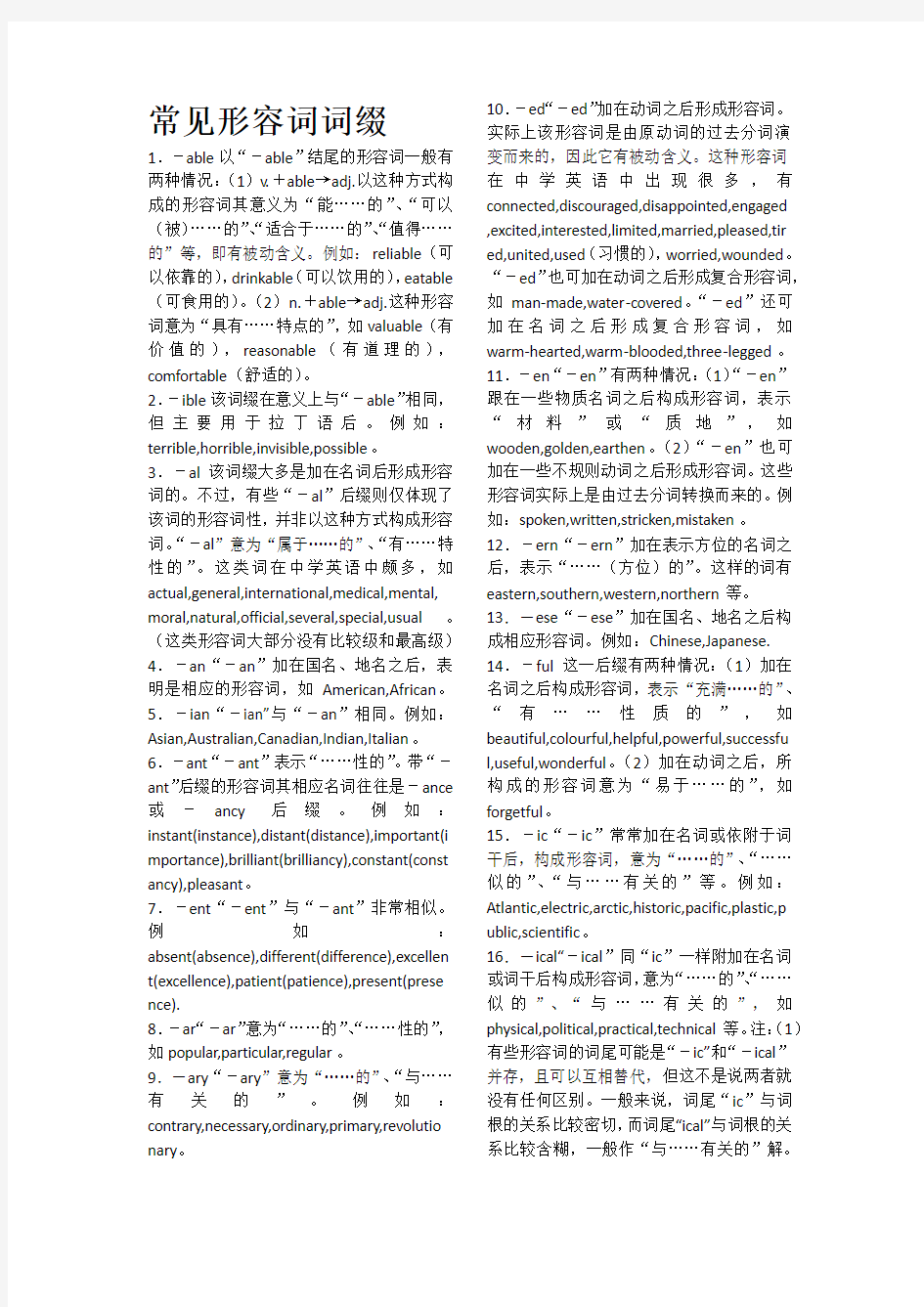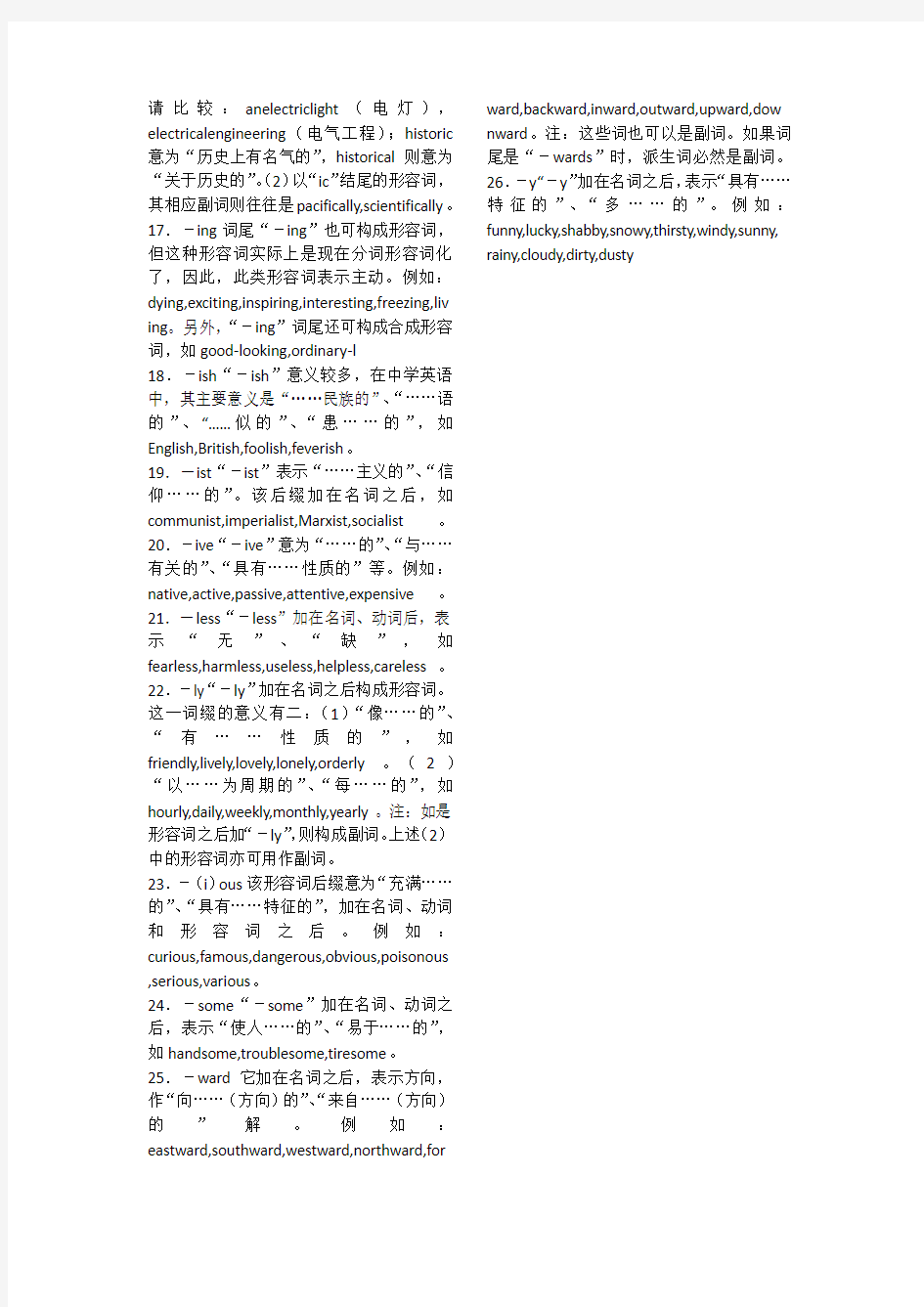常见形容词词缀


常见形容词词缀
1.-able以“-able”结尾的形容词一般有两种情况:(1)v.+able→adj.以这种方式构成的形容词其意义为“能……的”、“可以(被)……的”、“适合于……的”、“值得……的”等,即有被动含义。例如:reliable(可以依靠的),drinkable(可以饮用的),eatable (可食用的)。(2)n.+able→adj.这种形容词意为“具有……特点的”,如valuable(有价值的),reasonable(有道理的),comfortable(舒适的)。
2.-ible该词缀在意义上与“-able”相同,但主要用于拉丁语后。例如:terrible,horrible,invisible,possible。
3.-al该词缀大多是加在名词后形成形容词的。不过,有些“-al”后缀则仅体现了该词的形容词性,并非以这种方式构成形容词。“-al”意为“属于……的”、“有……特性的”。这类词在中学英语中颇多,如actual,general,international,medical,mental, moral,natural,official,several,special,usual。(这类形容词大部分没有比较级和最高级)4.-an“-an”加在国名、地名之后,表明是相应的形容词,如American,African。5.-ian“-ian”与“-an”相同。例如:Asian,Australian,Canadian,Indian,Italian。6.-ant“-ant”表示“……性的”。带“-ant”后缀的形容词其相应名词往往是-ance 或-ancy后缀。例如:instant(instance),distant(distance),important(i mportance),brilliant(brilliancy),constant(const ancy),pleasant。
7.-ent“-ent”与“-ant”非常相似。例如:absent(absence),different(difference),excellen t(excellence),patient(patience),present(prese nce).
8.-ar“-ar”意为“……的”、“……性的”,如popular,particular,regular。
9.-ary“-ary”意为“……的”、“与……有关的”。例如:contrary,necessary,ordinary,primary,revolutio nary。10.-ed“-ed”加在动词之后形成形容词。实际上该形容词是由原动词的过去分词演变而来的,因此它有被动含义。这种形容词在中学英语中出现很多,有connected,discouraged,disappointed,engaged ,excited,interested,limited,married,pleased,tir ed,united,used(习惯的),worried,wounded。“-ed”也可加在动词之后形成复合形容词,如man-made,water-covered。“-ed”还可加在名词之后形成复合形容词,如warm-hearted,warm-blooded,three-legged。11.-en“-en”有两种情况:(1)“-en”跟在一些物质名词之后构成形容词,表示“材料”或“质地”,如wooden,golden,earthen。(2)“-en”也可加在一些不规则动词之后形成形容词。这些形容词实际上是由过去分词转换而来的。例如:spoken,written,stricken,mistaken。12.-ern“-ern”加在表示方位的名词之后,表示“……(方位)的”。这样的词有eastern,southern,western,northern等。13.-ese“-ese”加在国名、地名之后构成相应形容词。例如:Chinese,Japanese. 14.-ful这一后缀有两种情况:(1)加在名词之后构成形容词,表示“充满……的”、“有……性质的”,如beautiful,colourful,helpful,powerful,successfu l,useful,wonderful。(2)加在动词之后,所构成的形容词意为“易于……的”,如forgetful。
15.-ic“-ic”常常加在名词或依附于词干后,构成形容词,意为“……的”、“……似的”、“与……有关的”等。例如:Atlantic,electric,arctic,historic,pacific,plastic,p ublic,scientific。
16.-ical“-ical”同“ic”一样附加在名词或词干后构成形容词,意为“……的”、“……似的”、“与……有关的”,如physical,political,practical,technical等。注:(1)有些形容词的词尾可能是“-ic”和“-ical”并存,且可以互相替代,但这不是说两者就没有任何区别。一般来说,词尾“ic”与词根的关系比较密切,而词尾“ical”与词根的关系比较含糊,一般作“与……有关的”解。
请比较:anelectriclight(电灯),electricalengineering(电气工程);historic 意为“历史上有名气的”,historical则意为“关于历史的”。(2)以“ic”结尾的形容词,其相应副词则往往是pacifically,scientifically。17.-ing词尾“-ing”也可构成形容词,但这种形容词实际上是现在分词形容词化了,因此,此类形容词表示主动。例如:dying,exciting,inspiring,interesting,freezing,liv ing。另外,“-ing”词尾还可构成合成形容词,如good-looking,ordinary-l
18.-ish“-ish”意义较多,在中学英语中,其主要意义是“……民族的”、“……语的”、“……似的”、“患……的”,如English,British,foolish,feverish。
19.-ist“-ist”表示“……主义的”、“信仰……的”。该后缀加在名词之后,如communist,imperialist,Marxist,socialist。20.-ive“-ive”意为“……的”、“与……有关的”、“具有……性质的”等。例如:native,active,passive,attentive,expensive。21.-less“-less”加在名词、动词后,表示“无”、“缺”,如fearless,harmless,useless,helpless,careless。22.-ly“-ly”加在名词之后构成形容词。这一词缀的意义有二:(1)“像……的”、“有……性质的”,如friendly,lively,lovely,lonely,orderly。(2)“以……为周期的”、“每……的”,如hourly,daily,weekly,monthly,yearly。注:如是形容词之后加“-ly”,则构成副词。上述(2)中的形容词亦可用作副词。
23.-(i)ous该形容词后缀意为“充满……的”、“具有……特征的”,加在名词、动词和形容词之后。例如:curious,famous,dangerous,obvious,poisonous ,serious,various。
24.-some“-some”加在名词、动词之后,表示“使人……的”、“易于……的”,如handsome,troublesome,tiresome。25.-ward它加在名词之后,表示方向,作“向……(方向)的”、“来自……(方向)的”解。例如:eastward,southward,westward,northward,for ward,backward,inward,outward,upward,dow nward。注:这些词也可以是副词。如果词尾是“-wards”时,派生词必然是副词。26.-y“-y”加在名词之后,表示“具有……特征的”、“多……的”。例如:funny,lucky,shabby,snowy,thirsty,windy,sunny, rainy,cloudy,dirty,dusty
(完整word版)常见形容词词缀
常见形容词词缀 1.-able 以“-able”结尾的形容词一般有两种情况: (1)v.+able→adj. 以这种方式构成的形容词其意义为“能……的”、“可以(被)……的”、“适合于……的”、“值得……的”等,即有被动含义。例如:reliable(可以依靠的),drinkable (可以饮用的),eatable(可食用的)。 (2)n.+able→adj. 这种形容词意为“具有……特点的”,如valuable(有价值的),reasonable (有道理的),comfortable(舒适的)。 2.-ible 该词缀在意义上与“-able”相同,但主要用于拉丁语后。例如:terrible,horrible,invi sible,possible。 3.-al 该词缀大多是加在名词后形成形容词的。不过,有些“-al”后缀则仅体现了该词的形容词性,并非以这种方式构成形容词。“-al”意为“属于……的”、“有……特性的”。这类词在中学英语中颇多,如actual,general,international,medical,mental,moral,natural,official,several,special,usual。(这类形容词大部分没有比较级和最高级) 4.-an “-an”加在国名、地名之后,表明是相应的形容词,如American,African。 5.-ian “-ian”与“-an”相同。例如:Asian,Australian,Canadian,Indian,Italian。 6.-ant “-ant”表示“……性的”。带“-ant”后缀的形容词其相应名词往往是-ance或-ancy 后缀。例如:instant(instance),distant(distance),important(importance),brilliant(brilliancy),consta nt(constancy),pleasant。 7.-ent “-ent”与“-ant”非常相似。例如:absent(absence),different(difference),excelle nt(excellence),patient(patience),present(presence). 8.-ar “-ar”意为“……的”、“……性的”,如popular,particular,regular。 9.-ary “-ary”意为“……的”、“与……有关的”。例如:contrary,necessary,ordinary,prim ary,revolutionary。 10.-ed “-ed”加在动词之后形成形容词。实际上该形容词是由原动词的过去分词演变而来的,因此它有被动含义。这种形容词在中学英语中出现很多,有connected,discouraged,disappointed,engaged,exc ited,interested,limited,married,pleased,tired,united,used(习惯的),worried,wounded。 “-ed”也可加在动词之后形成复合形容词,如man-made,water-covered。 “-ed”还可加在名词之后形成复合形容词,如warm-hearted,warm-blooded,three-legged。11.-en “-en”有两种情况: (1)“-en”跟在一些物质名词之后构成形容词,表示“材料”或“质地”,如wooden,golden,earthe n。 (2)“-en”也可加在一些不规则动词之后形成形容词。这些形容词实际上是由过去分词转换而来的。例如:spoken,written,stricken,mistaken。 12.-ern “-ern”加在表示方位的名词之后,表示“……(方位)的”。这样的词有eastern,sout hern,western,northern等。 13.-ese “-ese”加在国名、地名之后构成相应形容词。例如:Chinese,Japanese. 14.-ful 这一后缀有两种情况: (1)加在名词之后构成形容词,表示“充满……的”、“有……性质的”,如beautiful,colourful,he lpful,powerful,successful,useful,wonderful。 (2)加在动词之后,所构成的形容词意为“易于……的”,如forgetful。 15.-ic “-ic”常常加在名词或依附于词干后,构成形容词,意为“……的”、“……似的”、
初中 最常见词根词缀总结
初中常用词根词缀总结 前缀 1、ab--表示反常,否定,离开abnormal absent 2、ante--在.......之前anteroom antecedent 3、anti--防止,反对antiwar antifreeze 4、auto--自动的automobile autorun 5、bi--两个,双bicycle bilateral 6、co--一起,共同cooperate coexist 7、com--一起,共同combine compete 8、contra--相反contrast contradict 9、de--往下,离开,减少decrease devalue 10、dis--表示否定dislike disappear 11、ex--向外,以前的export ex-wife 12、extra--超过extraordinary 13、fore--在......之前forehead foresee 14、hemi--一半hemisphere hemicycle 15、homo--相同的homosexual 16、il--表示否定illegal illiterate 17、im--表示否定impossible impolite 18、in--表示向内,也表否定indoor independent 19、inter--在.......之间,彼此international interchange 20、ir--表示否定irregular irrelative 21、kilo--千(构成名词,常用于计量单位)kilometer kilogram 22、mid--中,中部midnight midlife 23、mini--小的,迷你的miniskirt ministate 24、mis--坏的,错误misuse mistake 25、non--表示否定nonstop nonhuman 26、out--外面,超过outgoing outsize 27、over--过度,覆盖overwork overcoat 28、pre--在........之前prehistory preschool 29、re--重复,重新rebuilt reconsider 30、step--后,继的stepfather stepchild 1
英语名词形容词动词后缀
名词后缀 (1)具有某种职业或动作的人 1)-an, -ain, 表示"……地方的人,精通……的人“American, historian, 2)-al, 表示"具有……职务的人" principal, 3)-ant,-ent, 表示"……者“merchant, agent, servant, student, 4)-ar, 表示"……的人“scholar, liar, peddler 5)-ard, -art, 表示"做……的人“coward, laggard, braggart(夸张者) 6)-arian, 表示"……派别的人,……主义的人“humanitarian, vegetarian 7)-ary, 表示"从事……的人" secretary, missionary 8)-ant, 表示"具有……职责的人" candidate, graduate 9)-ator, 表示"做……的人" educator, speculator(投机者) 10)-crat, 表示"某种政体,主义的支持者" democrat, bureaucrat 11)-ee, 表示"动作承受者" employee, examinee 12)-eer, 表示"从事于……人" engineer, volunteer 13)-er, 表示"从事某种职业的人, 某地区,地方的人" banker, observer, Londoner, villager 14)-ese, 表示" ……国人,………地方的人“Japanese, Cantonese 15)-ess, 表示"阴性人称名词,actress, hostess, manageress 16)-eur, 表示"……家“amateur, littérateur 17)-ian, 表示"……地方人,信仰…….教的人,从事……职业的人“Christian, physician(内科医生),musician 18)-ician, 表示"精通者,……家,“electrician, magician, technician 19)-icist, 表示"……家,…….者, …….能手“physicist, phoneticist, technicist 20)-ic, 表示"……者,……师" mechanic, critic 21)-ie, 表示"爱,指小" dearie, auntie, lassie(小姑娘) 22)-ier, 表示"从事……职业“cavalier, clothier, brazier(黄铜匠) 23)-ine, ian, 表示"阴性人称" heroine, ballerina 24)-ist, 表示"从事……研究者,信仰……主义者" pianist, communist, dentist, artist, chemist 25)-ive, 表示"动作者,行为者“native, captive 26)-logist, 表示"……学家,研究者" biologist, geologist(地质学家) 27)-or, 表示"……者" author, doctor, operator, 28)-ster, 表示"做…….事情的人“youngster, gamester(赌徒),songster 29)-yer, 表示" 从事……职业者“lawyer (2). 构成,具有抽象名词的含义本文 1)-acy, 表示"性质,状态,境遇" accuracy, diplomacy 2)-age, 表示"状态,行为,身份及其结果,总称" courage, storage, marriage 3)-al, a)表示"事物的动作,过程“refusal, arrival, survival, denial, approval b)表示具体的事物manual, signal, editorial, journal 4)-ance, -ence表示"性质,状况,行为,过程,总量,程度“endurance, importance, diligence, difference, obedience 5)-ancy, -ency, 表示"性质,状态,行为,过程" frequency, urgency, efficiency, 6)-bility, 表示"动作,性质,状态" possibility, feasibility, 7)-craft, 表示"工艺,技巧“woodcraft, handicraft, statecraft(治国策) 8)-cracy, 表示"统治,支配" bureaucracy, democracy 9)-cy, 表示"性质,状态,职位,级别" bankruptcy(破产),supremacy 10)-dom, 表示"等级,领域,状态" freedom, kingdom, wisdom 11)-ery, -ry, 表示"行为,状态,习性" bravery, bribery, rivalry 12)-ety, 表示"性质,状态“variety, dubiety(怀疑) 13)-faction, -facture, 表示"作成,……化,作用" satisfaction, manufacture 14)-hood, 表示"资格,身份, 年纪,状态" childhood, manhood, falsehood 15)-ice, 表示"行为,性质,状态" notice, justice, service 16)-ine, 表示"带有抽象概念" medicine, discipline, famine 17)-ing, 表示"动作的过程,结果" building, writing, learning 18)-ion, -sion, -tion, -ation, -ition, 表示"行为的过程,结果,状况" action, solution, conclusion, destruction, expression, 19)-ise, 表示"性质,状态“exercise, merchandise(商业) 20)-ism, 表示"制度,主义,学说,信仰,行为" socialism, criticism, colloquialism, heroism 21)-ity, 表示"性质,状态,程度“purity, reality, ability, calamity 22)-ment, 表示"行为,状态,过程,手段及其结果treatment, movement, judgment, punishment, argument 23)-mony, 表示"动作的结果,状态" ceremony, testimony 24)-ness, 表示"性质,状态,程度" goodness, kindness, tiredness, friendliness
形容词后缀大全
(1)带有“属性,倾向,相关”的含义 1)-able, -ible, movable, comfortable, applicable, visible, responsible 2)-al, natural, additional, educational 3)-an, ane, urban, suburban, republican 4)-ant, -ent, distant, important, excellent 5)-ar, similar, popular, regular 6)-ary, military, voluntary 7)-ice, -atie, ical, politic, systematic, historic, physical, 8)-ine, masculine, feminine, marine 9)-ing, moving, touching, daring 10)-ish, foolish, bookish, selfish 11)-ive, active, impressive, decisive 12)-ory, satisfactory, compulsory 13)-il, -ile, -eel, fragile, genteel(文雅的) (2) 表示“相象,类似”的含义 1)-ish, boyish, childish 2)-esque, picturesque 3)-like, manlike, childlike 4)-ly, manly, fatherly, scholarly, motherly 5)-some, troublesome, handsome 6)-y, milky, pasty (3) 表示“充分的”含义 1)-ful, beautiful, wonderful, helpful, truthful 2)-ous, dangerous, generous, courageous, various 3)-ent, violent
26种英语形容词后缀讲解
26种英语形容词后缀讲解 ◆-able 以“-able”结尾的形容词一般有两种情况: (1)v.+able→adj. 以这种方式构成的形容词其意义为“能……的”、“可以(被)……的”、“适合于……的”、“值得……的”等,即有被动含义。例如:reliable(可以依靠的),drinkable (可以饮用的),eatable(可食用的)。 (2)n.+able→adj. 这种形容词意为“具有……特点的”,如valuable(有价值的),reasonable(有道理的),comfortable (舒适的)。 ◆-ible 该词缀在意义上与“-able”相同,但主要用于拉丁语 后。例如:terrible,horrible,invi sible,possible。 ◆-al 该词缀大多是加在名词后形成形容词的。不过,有些“-al”后缀则仅体现了该词的形容词性,并非以这种方式构成形容词。“-al”意为“属于……的”、“有……特性的”。这类词在中学 英语中颇多,如 actual,general,international,medical,mental,moral,natural, official,several,special,usual。(这类形容词大部分没有比较 级和最高级) ◆-an “-an”加在国名、地名之后,表明是相应的形容词,如 American,African。 ◆-ian “-ian”与“-an”相同。例如: Asian,Australian,Canadian,Indian,Italian。
◆-ant “-ant”表示“……性的”。带“-ant”后缀的形容词其相 应名词往往是-ance或-ancy后缀。例如:instant(instance),distant(distance),important(importance), brilliant(brilliancy),consta nt(constancy),pleasant。 ◆-ent “-ent”与“-ant”非常相似。例如: absent(absence),different(difference),excelle nt(excellence),patient(patience),present(presence). ◆-ar “-ar”意为“……的”、“……性的”,如 popular,particular,regular。 ◆-ary “-ary”意为“……的”、“与……有关的”。例如: contrary,necessary,ordinary,prim ary,revolutionary。 ◆-ed “-ed”加在动词之后形成形容词。实际上该形容词是由原动词的过去分词演变而来的,因此它有被动含义。这种形容 词在中学英语中出现很多,有 connected,discouraged,disappointed,engaged,exc ited,interested,limited,married,pleased,tired,united,used (习惯的),worried,wounded。 “-ed”也可加在动词之后形成复合形容词,如 man-made,water-covered。 “-ed”还可加在名词之后形成复合形容词,如 warm-hearted,warm-blooded,three-legged。 ◆-en “-en”有两种情况:
形容词后缀大全以及词例教学文案
形容词后缀大全以及 词例
形容词后缀大全以及词例 1.-able 表示“可…的,能…” 【例】 knowable ['n?u?bl] adj. 可知的 inflammable [?n'fl?m?b(?)l] adj. 易燃的(inflame点燃)conceivable [k?n'si?v?b(?)l] adj. 想象得出的(conceive 设想,想象) 2.-aceous 表示“具有…特征的” 【例】 herbaceous [h??'be???s] adj. 草本植物的(herb草) curvaceous [k??'ve???s] adj. 有曲线美的(curve曲线) foliaceous [,f??l?'e???s] adj. 叶状的(foli 叶+aceous;参考:foliage树叶) 3.-acious 表示“有特征的,多…的” 【例】 sagacious [s?'ge???s] adj. 睿智的(sage智者)
capacious [k?'pe???s] adj. 宽敞的(cap能→的+acious;参考:capble 有能力的) fallacious [f?'le???s] adj. 错误的(fall错;参考:fallacy谬误) 4.-al 表示“…的” 【例】 personal ['p??s(?)n(?)l] adj. 个人的(person人) continertal [k?nt?'nent(?)l] adj. 大陆的(contonent大陆)exceptional [?k'sep?(?)n(?)l] adj. 例外的(exception例外) 5.-an 可表名词和形容词,“…地方,.…人 【例】 American [?mer?k?n] adj. 美洲的 n. 美洲人 republican [r?'p?bl?k(?)n] adj. 共和国的 n.共和党人 suburban [s?'b??b(?)n] adj. 郊区的 6.-aneors 表示“…有;…特征的” 【例】 simultaneous [,s?m(?)l'te?n??s] adj. 同时发生的
形容词性后缀
后缀通常改变词性,构成意思相近的其它词性的词;少数后缀同时会改变词义。 A.形容词性后缀: 例:nation→national 民族的,国家的;nature→natural 自然的 equal平等的;special特别的;central中心的;agricultural农业的;electrical电的;facial面部的;fundamental 基本的;global全球的;personal个人的;racial种族的;spiritural精神的;theoretical理论的;typical典型的;mental心理的,智力的 表示“有能力的”例:eat→eatable 能吃的 adjustable: adjust (v. 调节) + -able àadj. “able to be adjusted可调节的”; respectable: respect(v. 尊敬) + -able àadj. “able to be respected可敬的”; adaptable: suit(v. 使适应) + -able àadj. “able to be adapted 可适应的”; 2.-able 加在“变形动词”的后面 applicable: apply(v. 应用) + -able àadj. “可应用的” deniable: deny(v. 否认) + -able àadj. “可否认的” triable: try(v. 尝试) + -able àadj. “可试验的” usable: use(v. 使用) + -able àadj. “可用的,合用的” 3.-able 有时与名词结合,表示“给予…的”,“值得…的” fashionable adj. 时尚的,时髦的 lovable adj. 可爱的 reasonable adj. 合理的 4. –able 后面加上不及物动词,构成的形容词有主动含义 agreeable: agree(vi.同意) + -able àadj. 欣然同意的,惬意的 reliable: rely(vi.依靠) + -able àadj. 可靠的 shrinkable: shrink(vi.缩水) + -able àadj. 会收缩的 variable: vary(vi.变化) + -able àadj. 可变化的 5. –able 加在词根后面 capable: cap-(to hold) + -able àadj. 有能力的 durable: dur-(to last持续) + -able àadj. 持久的 6. –ible 加上“动词词根”构成形容词 tangible: tang-(/tact- = to touch) + -ible àadj. that can be perceived by touch可触摸的visible: vis(= to see) + -ible àadj. that can be seen 可见的 terrible: terr(= to frighten) + -ible àadj. that can be frightened 可怕的 negligible: neglig(=neglect 忽略) + -ible àadj. that can be neglected 可忽略的 ian 表示“国家的,国家人的”。例:America→American 美国(人)的African(非洲人),American (美国人),Asian(亚洲人),Japanese(日本人),Chinese(中国人) 表示“方向的”。例:east→eastern东方的,south→southern南方的 northeastern a. 东北方的,在东北的,来自东北的northern a.北方的,北部的northwestern a. 在西北部的,西北方的,来自西北的southeastern a. 东南方的southern adj.南方的,南部的southwestern 例:beauty→beautiful 美丽的,care→careful 小心的 awful糟糕的可怕的wonderful好极的,精彩的careful小心的helpful有帮助的 useful有用的meaningful 有意义的beautiful漂亮的
常用英语形容词后缀
形容词后缀(1)带有"属性,倾向,相关"的含义 1) -able, -ible, movable, comfortable, applicable, visible, responsible 可移动的舒服的适当可应用明显可得到责任心 2) -al, natural, additional, educational, physical, 自然天生额外附加教育身体自然界 3) -an, ane, urban, suburban, republican 都市城郊土气共和国政体 4) -ant, -ent, distant, important, excellent 遥远冷漠不清晰重要卓越 5) -ar, similar, popular, regular 相似受欢迎规律 6) -ary, military, voluntary 军事好战自愿有意 7) -ice, -atie, ical, politic, systematic, historic, 谨慎有见识系统一贯历史 8) -ine, masculine, feminine, marine 有男子气概女孩子气海产海军 9) -ing, moving, touching, daring 感动可移动同情感人胆大意气风发勇敢 10) -ish, foolish, bookish, selfish, boyish, childish 愚蠢好学书呆子自私男孩子气孩子气 11) -ive, active, impressive, decisive 积极好动印象深刻决断坚决 12) -ory, satisfactory, compulsory 令人满意强制性;义务的必修 13) -il, -ile, -eel, fragile, genteel 表示"相象,类似"的含义 易碎脆弱文雅的;有礼貌的;有教养的;上流社会 2) -esque, picturesque 3) -like, manlike, childlike 4) -ly, manly, fatherly, scholarly, motherly 5) -some, troublesome, handsome 6) -y, milky, pasty 表示"充分的"含义 1) -ful, beautiful, wonderful, helpful, truthful 2) -ous, dangerous, generous, courageous, various 3) -ent, violent, 表示由某种物质形成,制成或生产的含义 1) -en, wooden, golden, woolen
形容词后缀大全以及词例
形容词后缀大全以及词例 表示“可…的,能…” 【例】 knowable ['n?u?bl] adj. 可知的 inflammable [?n'fl?m?b(?)l] adj. 易燃的(inflame点燃)conceivable [k?n'si?v?b(?)l] adj. 想象得出的(conceive 设想,想象) 表示“具有…特征的” 【例】 herbaceous [h??'be???s] adj. 草本植物的(herb草)curvaceous [k??'ve???s] adj. 有曲线美的(curve曲线)foliaceous [,f??l?'e???s] adj. 叶状的(foli 叶+aceous;参考:foliage树叶) 表示“有特征的,多…的” 【例】 sagacious [s?'ge???s] adj. 睿智的(sage智者)
capacious [k?'pe???s] adj. 宽敞的(cap能→的+acious;参考:capble有能力的) fallacious [f?'le???s] adj. 错误的(fall错;参考:fallacy谬误) 表示“…的” 【例】 personal ['p??s(?)n(?)l] adj. 个人的(person人)continertal [k?nt?'nent(?)l] adj. 大陆的(contonent大陆) exceptional [?k'sep?(?)n(?)l] adj. 例外的(exception 例外) 可表名词和形容词,“…地方,.…人 【例】 American [?mer?k?n] adj. 美洲的 n. 美洲人republican [r?'p?bl?k(?)n] adj. 共和国的 n.共和党人 suburban [s?'b??b(?)n] adj. 郊区的
常见形容词词缀
常见形容词词缀 1.-able以“-able”结尾的形容词一般有两种情况:(1)v.+able→adj.以这种方式构成的形容词其意义为“能……的”、“可以(被)……的”、“适合于……的”、“值得……的”等,即有被动含义。例如:reliable(可以依靠的),drinkable(可以饮用的),eatable(可食用的)。(2)n.+able→adj.这种形容词意为“具有……特点的”,如valuable(有价值的),reasonable (有道理的),comfortable(舒适的)。2.-ible该词缀在意义上与“-able”相同,但主要用于拉丁语后。例如:terrible,horrible,invisible,possible。3.-al该词缀大多是加在名词后形成形容词的。不过,有些“-al”后缀则仅体现了该词的形容词性,并非以这种方式构成形容词。“-al”意为“属于……的”、“有……特性的”。这类词在中学英语中颇多,如actual,general,international,medical, mental,moral,natural,official,several ,special,usual。(这类形容词大部分没有比较级和最高级)4.-an“-an”加在国名、地名之后,表明是相应的形容词,如American,African。5.-ian“-ian”与“-an”相同。例如:Asian,Australian,Canadian,Indian,Ital ian。 6.-ant“-ant”表示“……性的”。带“-ant”后缀的形容词其相应名词往往是-ance或-ancy后缀。例如:instant(instance),distant(distance),i mportant(importance),brilliant(brilli ancy),constant(constancy),pleasant。7.-ent“-ent”与“-ant”非常相似。例如:absent(absence),different(difference) ,excellent(excellence),patient(patien ce),present(presence). 8.-ar“-ar”意为“……的”、“……性的”,如popular,particular,regular。9.-ary“-ary”意为“……的”、“与……有关的”。例如:contrary,necessary,ordinary,primary,r evolutionary。 10.-ed“-ed”加在动词之后形成形容词。实际上该形容词是由原动词的过去分词演变而来的,因此它有被动含义。这种形容词在中学英语中出现很多,有connected,discouraged,disappointed,en gaged,excited,interested,limited,marr ied,pleased,tired,united,used(习惯的),worried,wounded。“-ed”也可加在动词之后形成复合形容词,如man-made,water-covered。“-ed”还可加在名词之后形成复合形容词,如warm-hearted,warm-blooded,three-legge d。11.-en“-en”有两种情况:(1)“-en”跟在一些物质名词之后构成形容词,表示“材料”或“质地”,如wooden,golden,earthen。(2)“-en”也可加在一些不规则动词之后形成形容词。这些形容词实际上是由过去分词转换而来的。例如:spoken,written,stricken,mistaken。12.-ern“-ern”加在表示方位的名词之后,表示“……(方位)的”。这样的词有eastern,southern,western,northern等。13.-ese“-ese”加在国名、地名之后构成相应形容词。例如:Chinese,Japanese. 14.-ful这一后缀有两种情况:(1)加在名词之后构成形容词,表示“充满……的”、“有……性质的”,如beautiful,colourful,helpful,powerful, successful,useful,wonderful。(2)加在动词之后,所构成的形容词意为“易于……的”,如forgetful。 15.-ic“-ic”常常加在名词或依附于词干后,构成形容词,意为“……的”、“……似的”、“与……有关的”等。例如:Atlantic,electric,arctic,historic,pac ific,plastic,public,scientific。16.-ical“-ical”同“ic”一样附加在名词或词干后构成形容词,意为“……的”、“……似的”、“与……有关的”,如physical,political,practical,technica l等。注:(1)有些形容词的词尾可能是“-ic”和“-ical”并存,且可以互相替代,
英语常见形容词后缀精品资料
英语常见形容词后缀
形容词后缀(1)带有"属性,倾向,相关"的含义 1) -able, -ible, movable, comfortable, applicable可应用的,合用的;可实施的, visible显而易见的, responsible 2) -al, natural, additional添加的;附加的;额外的, educational 3) -an, ane =acoustic noise environment 噪音环境, urban城市的;居住在城市的, suburban郊区的,近郊的, republican共和国的;共和政体的 4) -ant, -ent, distant非近亲的,远亲的, important, excellent 5) -ar, similar, popular, regular规则的,有规律的;固定的;正常的 6) -ary, military军事的;军用的, voluntary自愿的,志愿的 7) -ice, -atie, ical, politic精明的;有策略的, systematic有系统的;成体系的, historic历史上著名的, physical身体的,肉体的, 8) -ine, masculine男性的,男子的, feminine女性的,妇女的, marine海的;海生的,海产的 9) -ing, moving, touching, daring大胆的,勇敢的 10) -ish, foolish, bookish爱好书籍的, selfish 11) -ive, active, impressive感人的;令人钦佩的, decisive决定性的,决定的 12) -ory, satisfactory, compulsory必须做的;义务的;必修的 13) -il, -ile, -eel, fragile, genteel 表示"相象,类似"的含义 1) -ish, boyish, childish 2) -esque, picturesque 3) -like, manlike, childlike 4) -ly, manly, fatherly, scholarly, motherly 5) -some, troublesome, handsome
常见形容词词缀
常见形容词词缀1.-able以“-able”结尾的形容词一般有两种情况:(1)v.+able→adj.以这种方式构成的形容词其意义为“能……的”、“可以(被)……的”、“适合于……的”、“值得……的”等,即有被动含义。例如:reliable(可以依靠的),drinkable(可以饮用的),eatable (可食用的)。(2)n.+able→adj.这种形容词意为“具有……特点的”,如valuable(有价值的),reasonable(有道理的),comfortable(舒适的)。2.-ible该词缀在意义上与“-able”相同,但主要用于拉丁语后。例如:terrible,horrible,invisible,possib le。 3.-al该词缀大多是加在名词后形成形容词的。不过,有些“-al”后缀则仅体现了该词的形容词性,并非以这种方式构成形容词。“-al”意为“属于……的”、“有……特性的”。这类词在中学英语中颇多,如actual,general,international,medic al,mental,moral,natural,official,s everal,special,usual。(这类形容词大部分没有比较级和最高级)4.-an“-an”加在国名、地名之后,表明是相应的形容词,如American,African。5.-ian“-ian”与“-an”相同。例如:Asian,Australian,Canadian,Indian,I talian。 6.-ant“-ant”表示“……性的”。带“-ant”后缀的形容词其相应名词往往是-ance或-ancy后缀。例如:instant(instance),distant(distance ),important(importance),brilliant( brilliancy),constant(constancy),pl easant。 7.-ent“-ent”与“-ant”非常相似。例如: absent(absence),different(differen ce),excellent(excellence),patient( patience),present(presence).
最常见名词形容词后缀
常见形容词后缀 1、-able 以“-able”结尾的形容词一般有两种情况: (1)v、+able→adj、以这种方式构成的形容词其意义为“能……的”、“可以(被)……的”、“适合于……的”、“值得……的”等,即有被动含义。例如:reliabl e(可以依靠的),drinkable(可以饮用的),eatable(可食用的)。 (2)n、+able→adj、这种形容词意为“具有……特点的”,如valuable(有价值的),reasonable( 有道理的),comfortable(舒适的)。 2.-ible 该词缀在意义上与“-able”相同,但主要用于拉丁语后。 例如:terrible,horrible,invisible,possible。 3、-al该词缀大多就是加在名词后形成形容词的。 不过,有些“-al”后缀则仅体现了该词的形容词性,并非以这种方式构成形容词。“-al”意为“属于……的”、“有……特性的”。这类词在中学英语中颇多,如act ual,general,international,medical,mental,moral,natural,official,several,special,usual。( 这类形容词大部分没有比较级与最高级) 4.-ful 这一后缀有两种情况: (1)加在名词之后构成形容词,表示“充满……的”、“有……性质的”,如beautiful,colourful,he lpful,powerful,successful,useful,wonderful。(2)加在动词之后,所构成的形容词意为“易于……的”,如forgetful。 例如:Atlantic,electric,arctic,historic,pacific,plastic,public,s cientific。 5.-ical“-ical”同“ic”一样附加在名词或词干后构成形容词,意为“……的”、“……似的”、“与……有关的”,如physical,political,pr actical,technical等。 注:(1)有些形容词的词尾可能就是“-ic”与“-ical”并存,且可以互相替代,但这不就是说两者就没有任何区别。一般来说,词尾“ic”与词根的关系比较密切,而词尾“ical”与词根的关系比较含糊,一般作“与……有关的”解。 请比较:an electric light(电灯),electrical engineering(电气工程);histo ric意为“历史上有名气的”,historical则意为“关于历史的”。(2)以“ic”结尾的形容词,其相应副词则往往就是pacifically,scientifically。 6.-ing词尾“-ing”也可构成形容词,但这种形容词实际上就是现在分词形容词化了,因此,此类形容词表示主动。 例如:dying,exciting,inspiring,interesting,freezing,living。 另外,“-ing”词尾还可构成合成形容词,如good-looking,ordinary-l 7、-ist “-ist”表示“……主义的”、“信仰……的”。 该后缀加在名词之后,如communist,im perialist,Marxist,socialist。 8.-ive“-ive”意为“……的”、“与……有关的”、“具有……性质的”等。 例如:native,active,passive,attentive,expensive。 9.-less “-less”加在名词、动词后,表示“无”、“缺”, 10.-(i)ous 该形容词后缀意为“充满……的”、“具有……特征的”,加在名词、动词与形容词之后。 例如:curious,famous,dangerous,obvious,poisonous,ser ious,various。 常见名词后缀
